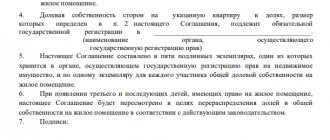Divorce for a family is associated with a lot of difficulties. This, of course, is a certain emotional state, and, of course, everyday issues, for example, the division of property. The fact of uncertainty can also cause concern for past spouses - what property can everyone count on after a divorce? What he can claim in court is one of the frequent questions in this area. What happens to the inheritance of spouses in the event of a divorce obtained during their marriage?
On the one hand, many have heard that property acquired during marriage is divided equally, but is inheritance considered property? Or is it the property of the spouse to whom it was given? In order to dispel all the myths and rumors, I decided to prepare a thorough material on this topic, which is relevant for 2021. We will discuss in detail the different types of inheritance received, as well as mechanisms for resolving these situations.
If the apartment was inherited by will, is it divided during a divorce?
Inheritance, like gifts, is considered personal property and cannot be divided. An apartment received by will, regardless of who the testator was and under what conditions the person became an heir, belongs to precisely this type of personal property. But this is only a general rule. Under certain conditions, even an apartment inherited under a will is subject to division between spouses.
Recognition of joint property
If real estate is recognized as joint property, then it no longer matters how it was originally acquired. In this situation, it is subject to division on a general basis, like any other object. A similar situation may arise when the price of an apartment during the period of marriage has increased significantly due to major repairs, reconstruction, re-equipment or addition of new premises carried out at the expense of the family budget (the latter is relevant when the property is on the ground floor).
Example : Ivan inherited an apartment worth 1 million rubles. It was a bare box with rough repairs. At this stage it is still considered personal property. After marriage, Ivan and his wife, at the expense of the family budget, carried out major repairs, installed plumbing equipment and household appliances. After this, the value of the property increased to 2 million rubles. In the event of a divorce, the spouse has every right to sue to recognize the apartment as joint property and will most likely win it.
If the repairs are carried out at the expense of the heir’s personal funds (for example, from money also received as an inheritance or as a gift), then the other half has no right to claim any part of the property.
Marriage contract
Some couples enter into a prenuptial agreement. This document may include clauses concerning, among other things, the division of property. An agreement of this type is not limited by anything other than the goodwill of both parties and therefore it is difficult to predict what exactly will be written in it.
Example : The spouses entered into a marriage contract, according to which any of their property, including personal property, is considered jointly acquired, regardless of when it was acquired/received (before the wedding or after it). In this situation, during a divorce, all property is divided in half, including the apartment received as an inheritance.
Heirs - spouses
If the testator knows both spouses well or is in one way or another a common relative (even an extremely distant one), he can draw up a will that includes both parties. If we consider the option with an apartment, then in this situation it is considered personal property, but of the shared type, when one spouse owns one part of the apartment, and the other - the second. The situation is aggravated if married couples carry out major repairs to it. In this situation, they become entitled to half of the other half's share. This is only relevant if their shares were not equal in the will. Otherwise, nothing changes.
Example : The Ivanov spouses received an apartment as their personal property by inheritance. The husband received 90% and the wife 10%. They subsequently carried out major renovations to the property and are now entitled to each party's half. During a divorce, they can recognize it as joint property and divide the existing parts in half. It turns out that the husband loses 45% of his share and receives 5% of his wife’s share, and the wife, on the contrary, loses 5% and receives 45%.
Division of property if both spouses are heirs
The law provides for 2 possible ways for both spouses to jointly own inherited property during a marriage:
- When the deceased person mentioned both in his will. In this case, both the husband and wife acquire the rights of full owners of real estate or other property in those shares that are specified in the posthumous document.
- In an extremely unfortunate set of circumstances, when all the children and immediate relatives of the spouses die, by law they both become equal heirs of the property.
How is a privatized apartment divided after the death of the owner according to the will?
There are two ways to divide a privatized apartment inherited by will during a divorce: by voluntary agreement of the parties and through court proceedings. The first method is simpler and cheaper, the second is more difficult, longer and more expensive, but is relevant when it is impossible to reach an agreement.
Trial
One of the spouses, not satisfied with the fact that the apartment is not divided during a divorce, has the right to file a lawsuit demanding that the property be recognized as joint property and divided into equal shares.
Procedure
- Evaluate real estate.
- File a claim. You can use the example below as a basis.
- Submit an application to the court at the place of residence or location of the disputed property.
- Attend the meeting or entrust this process to representatives.
- Wait for the court's decision and follow the points specified in it.
Real estate appraisals should be carried out only with the help of a licensed appraisal company that has the right to carry out just such operations. Otherwise, it will not be taken into account in court, and this is necessary to determine the amount of the state duty. As a consequence, the hearing will be postponed until all documents are brought into full compliance with legal requirements.
Statement of claim
The statement of claim is drawn up in accordance with Article 131 of the Code of Civil Procedure of the Russian Federation.
Documentation
When submitting an application to the court, you will need to attach to it:
- Plaintiff's passport.
- Receipt for payment of state duty.
- Death certificate of the testator.
- Will.
- Marriage certificate.
- Real estate valuation report.
- Confirmation of the fact of ongoing repair work or other actions that have globally changed the value of the apartment during the marriage.
- Other documents that may influence the court's decision.
The defendant has the right to provide evidence of his case, using both the plaintiff’s documents and his own package of papers.
Expenses
Cases of this type are related to property and therefore the state duty is paid in the amount corresponding to subparagraph 1 of paragraph 1 of Article 333.19 of the Tax Code of the Russian Federation. In the case of real estate, whose value in most cases exceeds 1 million rubles, the last paragraph of this subparagraph is most relevant. It says that the state duty is 0.5% of the amount exceeding 1 million rubles and an additional 13,200.00 rubles as a fixed payment. The total amount of state duty in this situation cannot be more than 60 thousand rubles.
Example : An apartment, based on the appraisal report, costs 6 million rubles. The state duty will be 0.5% of 5 million + 13,200.00 = 25,000.00 + 13,200.00 = 38,200.00 rubles.
In addition, you will have to spend money on an assessment report (about 5 thousand rubles) and re-registration of property rights (another 2 thousand rubles).
Settlement agreement
If, during the consideration of the case in court, the parties are still able to agree among themselves and enter into a settlement agreement, the proceedings are immediately terminated, and the former spouses act on the basis of the settlement agreement. However, you will still have to pay the state fee in full.
A settlement agreement can be concluded only before a court decision.
Voluntary agreement
This is a simpler version of the division of real estate, in which the parties agree with each other on the division of any property, including personal property. It doesn't matter how it was obtained.
The costs in this case will be significantly lower. They will amount to 0.5% of the value of the property (so it will still have to be assessed). For example, let’s look at the same option with real estate for 6 million. The price of notarization will be 30 thousand rubles and about 3-4 thousand more will have to be paid to the notary for drawing up the agreement or checking it.
Shared ownership. How can it be disposed of?
Many citizens who received a certain property share in an apartment after a divorce are concerned about what to do with this share now and how it can be used. The main option here will be cohabitation. If such a scheme of further actions does not suit the ex-spouse at all, he can exercise his legal right to sell the share. However, it should be remembered here that it will most likely be quite difficult to find a buyer for only one part of the apartment.
The most optimal solution here would be to sell the entire apartment and then divide the proceeds from the transaction in accordance with the size of the shares of each spouse. However, in order to sell the entire property, it is necessary to obtain official consent from each owner of the property share. If it is not possible to obtain such consent from at least one owner, the option of selling the entire apartment will be excluded.
Options for dividing an apartment received by will during divorce
During a divorce, there are 5 main options for dividing real estate, of which only 3 actually remain more or less relevant.
- Cohabitation. In theory, ex-spouses can continue to live together in the same apartment, but in practice such mutual understanding is extremely rare.
- Isolation in kind. The apartment is physically divided into two separate living spaces with all necessary communications and a separate exit. It is also extremely rare, since in most cases, the exit from the apartment, the bathroom and the kitchen are presented in one copy.
- Sale. This is a more realistic option, in which the spouses sell the property and divide the proceeds among themselves according to their allotted shares.
- Compensation. One of the spouses literally buys out the share of the other, provided that both agree to such an operation.
- Exchange. One of the spouses exchanges the share of the other for any other property. For example, to a country house, land, garage and/or car. Also, as in the previous case, mutual consent is required.
Legal basis for dividing money
According to current legislation, the same principle applies to money and deposits as to other property: funds are divided equally. However, one cannot fail to take into account that money is a rather specific subject, and it is not always possible to complete the division in such a way that each party has no claims.
Unlike other property (for example, real estate or cars), it is difficult to determine exactly how much money to divide. Therefore, during a divorce, only those funds are divided, the receipt of which into the general family budget is documented.
As a rule, it is difficult to provide any documentary evidence in relation to cash, and therefore, fair division can most often only be counted on in relation to bank deposits.
Arbitrage practice
Let's look at a couple of examples from judicial practice:
Example No. 1 : Krasnova I.V. (plaintiff) appealed to the court with a demand to recognize the apartment received by her ex-husband (defendant) under the will as an inheritance, jointly acquired property and its division into equal shares. She provided evidence that after receiving the inheritance, major repairs were carried out in the apartment, which increased its value by half. The defendant does not object to the division, but demands that the spouse’s share be not half of the value of the property, but half of the amount spent on repairs. According to Article 256 of the Civil Code of the Russian Federation (clause 2), property received as an inheritance is personal property and therefore does not belong to the division. However, the same paragraph states that if significant investments were made during the marriage (in this case, leading to a significant increase in the price of the apartment), the property can be recognized as jointly acquired property. Article 39 of the RF IC states that jointly acquired property is divided into equal shares, however, clause 3 of Article 38 of the RF IC specifies that in the event of a dispute, division is carried out in court. Based on the above, the court decided to partially satisfy the plaintiff’s demands by transferring part of the property to her, but taking into account the amount of investments, transfer not half of the property, but half of the funds spent on repairs.
Example No. 2 : The plaintiff (ex-husband) demands to recognize the apartment received by the defendant (ex-wife) under the will as an inheritance as jointly acquired property and to divide it into equal shares upon divorce. He points to the fact that when he inherited the property, the apartment was in rough finishing condition. The major repairs, according to the plaintiff, were carried out by him personally. Based on the assessment report, the cost of the apartment after the renovation more than doubled. Evidence of self-repairs was not provided. The defendant does not comment in any way on the plaintiff’s statement regarding the personal repairs, but provided documentary evidence of the purchase of building materials using funds also received as an inheritance, that is, being her personal property. According to Article 256 of the Civil Code of the Russian Federation (clause 2), property received as an inheritance is personal property. In this case, this includes the apartment, funds in the account and building materials. This property is not subject to division. The defendant did not provide evidence of repairs. No agreements were concluded between the spouses either during the marriage or after the divorce. It was decided to reject the claims due to lack of evidence that the plaintiff was right.
The division of an apartment inherited as part of a will can become a serious problem for a non-specialist. A serious evidence base is required that can influence the court's decision. We recommend that you first discuss this issue at a free consultation and use the services of experienced legal representatives to resolve the property dispute as profitably as possible.
FREE CONSULTATIONS are available for you! If you want to solve exactly your problem, then
:
- describe your situation to a lawyer in an online chat;
- write a question in the form below;
- call Moscow and Moscow region
- call St. Petersburg and region
Save or share the link on social networks
- FREE for a lawyer!
Write your question, our lawyer will prepare an answer for FREE and call you back in 5 minutes.
By submitting data you agree to the Consent to PD processing, PD Processing Policy and User Agreement
Useful information on the topic
8
State duty for division of property of spouses
When filing a statement of claim demanding division of property, payment is made...
21
How is a house bought with maternity capital divided during a divorce?
The most common and effective government assistance is for families with two and...
2
Inheriting weapons after death
According to Article 20 of Federal Law No. 150 and Article 1180 of the Civil Code of the Russian Federation, every person...
Are alimony debts inherited?
Payment of alimony is one of the main sources of income for...
12
Division of a mortgaged apartment during a divorce
Divorce of married couples whose apartment has a mortgage, in addition to the general...
3
Division of a municipal apartment during divorce
The division of property during a divorce is one of the most difficult stages...
The apartment was purchased before the union
If an apartment was purchased before marriage, how does inheritance happen? The second spouse has no rights to it . However, if the mortgage agreement was signed before the marriage, and loan payments were made after the marriage was registered, the part of the apartment paid for after the marriage was registered is considered joint property and is subject to divorce.
If, before the official marriage, the future spouses bought an apartment together, but it was registered only in the name of one, the other spouse, who claims a share in it during a divorce, must prove that he also contributed money to purchase this apartment.
After a divorce, a former family member may receive a demand from the landlord to leave. Unfortunately, this requirement is legal. The only thing you can ask the judge (this is provided for by law) is a few months to find a new home.
But even if the search for housing is not successful, after these few months you will have to move out. Even payment of utility bills does not give rise to the right to own and use the apartment.
Does the child have the right to a share in the property that the parent inherited?
Children and parents have no rights to each other's property. Therefore, if a child becomes an heir to property, the parent cannot sell or change it at his own discretion. Sales are permitted only in exceptional cases and with the consent of the district guardianship department.
In the event of the death of a parent and in the absence of a will, the child receives priority rights to all of his property. In this case, he can receive a share of the object that was previously inherited by the parent. But only if at the time of death the parent continued to be the owner of the object.
Is a bequeathed apartment subject to division?
Based on the provisions of Part 2 of Art. 39 of the RF IC, which establishes that the personal property of spouses cannot be divided; an inherited apartment or an apartment received by will is not subject to division.
It is recognized as personal property on the basis that inheritance is one of the forms of a gratuitous transaction that does not require the investment of funds for the acquisition of property transferred to the new owner.
Important! It does not matter who exactly bequeathed the apartment - parents, close or distant relatives, friends. The resulting property does not change its status - the apartment was and remains the personal property of the person to whom it was transferred in the will. Such an apartment will not participate in the division during a divorce .
Inherited property – joint property?
Property that a spouse received under a gratuitous transaction is considered personal (Article 36 of the RF IC).
Inheritance is just a gratuitous transaction. Objects received as an inheritance are not subject to the rules on joint ownership. Except in cases where both spouses become heirs of the property.
Example. Valentina bequeathed an apartment to her son and daughter-in-law. The spouses did not divide it and registered it as joint property.
Trust management of inherited property
Validity of a marriage contract in the event of the death of one of the spouses






